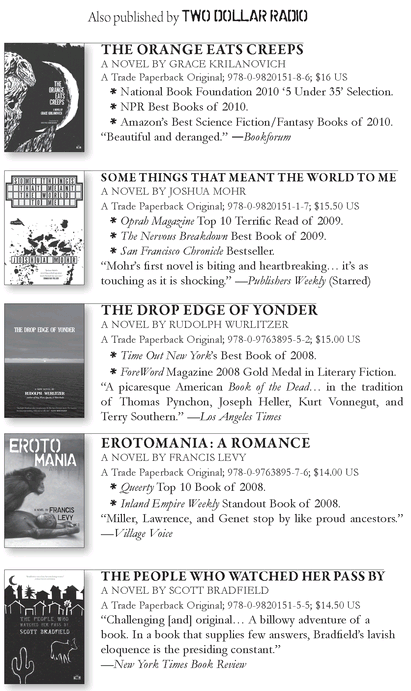The Correspondence Artist (24 page)
Read The Correspondence Artist Online
Authors: Barbara Browning
Nelson Algren similarly careened between self-effacement and self-aggrandizement. Sometimes it's hard to say whether it's one thing he's doing or the other. You could argue that he was the one who brought on his own obscurity at the end of his life. He certainly predicted it. They misspelled his name on his tombstone. But a few years before, he'd written that it didn't really matter having your name attached to anything, as long as it was inscribed “on some cornerstone of a human heart.” He said, “On the heart it don't matter how you spell it.”
Â
Â
The picture of my heart on a plate may have been misleading, but it doesn't really correspond to the photo with the con artist. The con artist doesn't correspond to me, or Binh, and in many ways Binh doesn't correspond to the paramour. Neither does Tzipi, or Santutxo, or Djeli. Simone de Beauvoir doesn't correspond to my lover, and I don't correspond to Simone, or Nelson Algren, or “the ugly woman.” The paramour doesn't correspond to Zeppo Marx in
Monkey Business
, and I don't correspond to Tony Curtis as the “body slave.” In fact, I don't really correspond to this narrative voice. Or I do, but I don't. There were many of us, or maybe we were just two. We were hardly elite Chinese intellectuals, or French ones â we just wanted to feel like we were for a little while, and it was romantic and it was sexy and I know I'm going to miss it. I mean I'll miss the fiction, I'll miss Tzipi and her cruelty and her hair, I'll miss Binh's strange images and his beautiful cock, and Djeli's angelic voice, and Santutxo's hypochondria. I'll miss waking up every morning and running to the computer so I could be with them again. And I cried a little, again, writing the end.
Monkey Business
, and I don't correspond to Tony Curtis as the “body slave.” In fact, I don't really correspond to this narrative voice. Or I do, but I don't. There were many of us, or maybe we were just two. We were hardly elite Chinese intellectuals, or French ones â we just wanted to feel like we were for a little while, and it was romantic and it was sexy and I know I'm going to miss it. I mean I'll miss the fiction, I'll miss Tzipi and her cruelty and her hair, I'll miss Binh's strange images and his beautiful cock, and Djeli's angelic voice, and Santutxo's hypochondria. I'll miss waking up every morning and running to the computer so I could be with them again. And I cried a little, again, writing the end.
But your friends can always see this fiction for what it is from the outside, and they know that you could be happy again if you wanted to. This is almost exactly the way
The Mandarins
ends, but a little more “American” and less existentialist.
The Mandarins
ends, but a little more “American” and less existentialist.
ACKNOWLEDGEMENTS
Thanks to: S. Calle (inspiration), H. Mathews and M. Chaix (glass of wine and a Cuban); D. Levine (title); J. Taylor (notes); E. Obenauf and E. Obenauf (even more notes); A. Pellegrini, C. Smith, C. Swartz, A. Schnore, J. Lewis, J. Vaccaro, R. Enriquez, and V. DeConcini (encouragement); L. Oliveira (misgivings); E. Cowhig (maternal grace). Tzipi, sorry.

TWO DOLLAR RADIO
is a family-run outfit founded in 2005 with the mission to reaffirm the cultural and artistic spirit of the publishing industry.
is a family-run outfit founded in 2005 with the mission to reaffirm the cultural and artistic spirit of the publishing industry.
Â
We aim to do this by presenting bold works of literary merit, each book, individually and collectively, providing a sonic progression that we believe to be too loud to ignore.
Copyright © 2011 by Barbara Browning
All rights reserved.
eISBN : 978-0-983-24712-8
Library of Congress Control Number: 2010943433
Typeset in Garamond, the best font ever, and Calibri.
Â
All images used with permission.
Â
Â
No portion of this book may be copied or reproduced, with the exception of quotes used in critical essays and reviews, without the written permission of the publisher.

Other books
Manhunting in Mississippi by Stephanie Bond
A Closed Book by Gilbert Adair
Flesh Failure by Sèphera Girón
Yo Acuso by Emile Zola
Flight of the Crow by Melanie Thompson
Until by Timmothy B. Mccann
Poison: A Novel of the Renaissance by Sara Poole
The Million-Dollar Wound by Collins, Max Allan
The Glass Shoe by Kay Hooper
Death in the Age of Steam by Mel Bradshaw